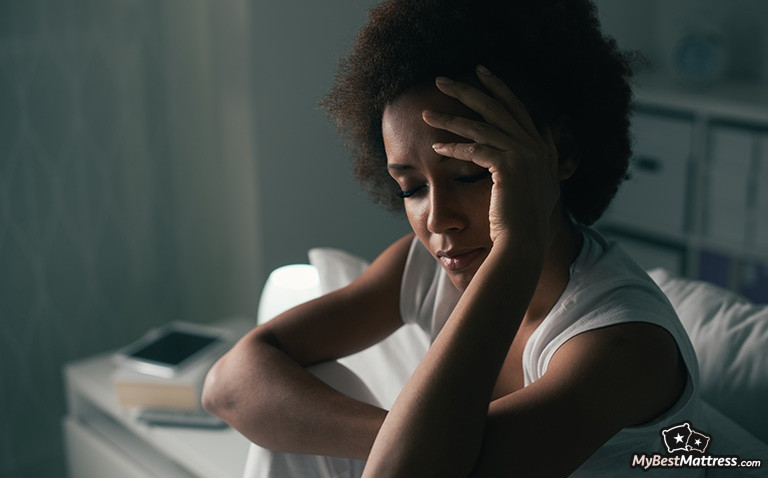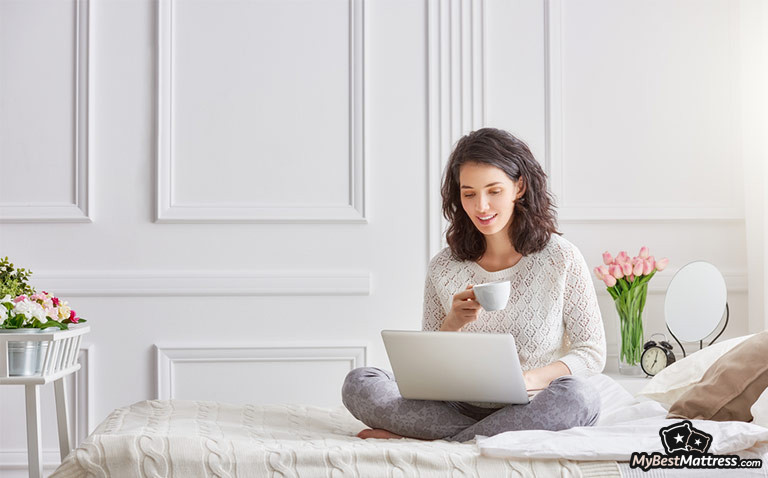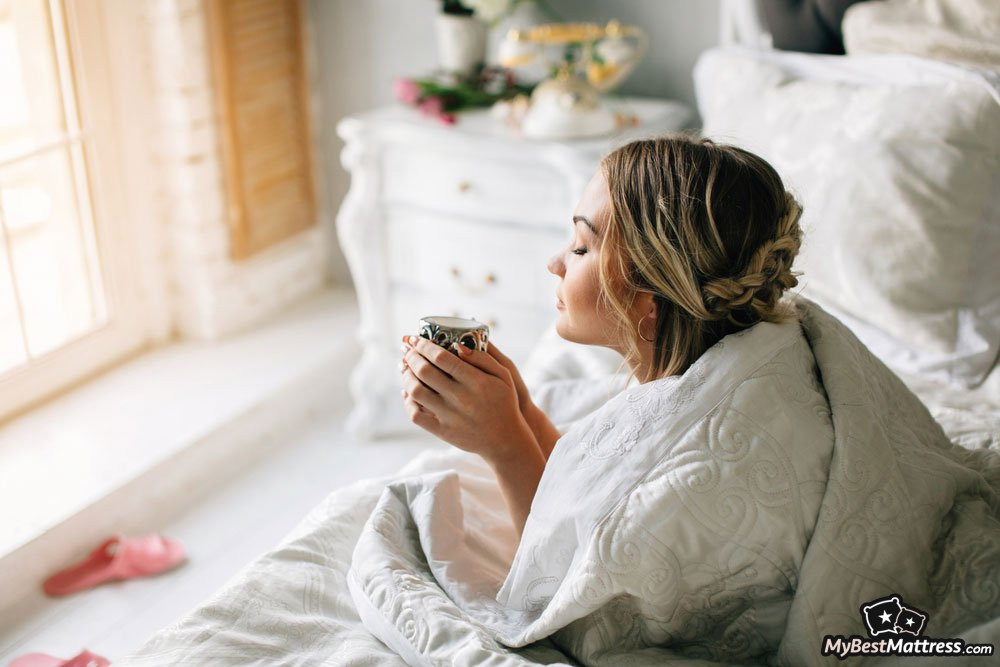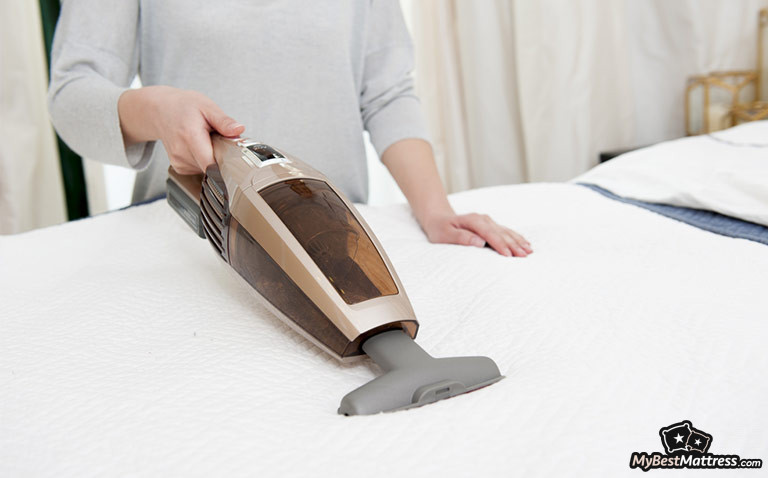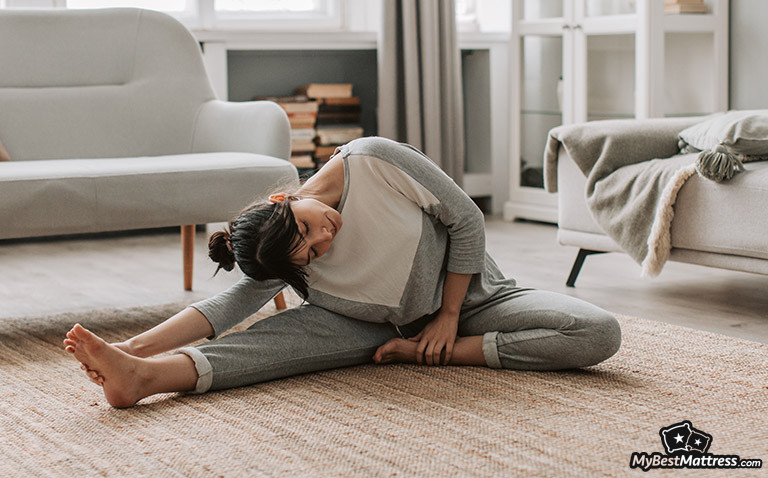
Have you ever heard of yoga before bed? Have you ever had trouble sleeping? Experienced insomnia or sleep anxiety?
The majority of us probably know that good sleep is one of the most critical factors of our health. And if you are here, you are probably aware of how essential it is to pursue a healthy lifestyle and have pleasant sleeping conditions, which could mean additionally having a good quality mattress like Saatva.
Unfortunately, today's statistics show that between 10% and 30% of adults struggle with chronic insomnia. The numbers seem high for a sleeping disorder, would you agree? With that in mind, a question appears: could yoga help these people? To answer that as well as I can, in this article, we'll talk about how to use yoga for better sleep.
So let's bring your sleeping quality to the next level.
Table of Contents
- 1. What is Yoga Before Bed
- 2. Why Can't I Sleep
- 2.1. Diet
- 2.2. Screen Time
- 2.3. Anxiety And Depression
- 2.4. Excercise
- 2.5. Energy Drinks, Green Tea, and Coffee
- 3. Combine Tea And Yoga For Better Sleep
- 4. Yoga For Insomnia
- 4.1. How Does Yoga Help You Sleep
- 5. Other Sleeping Disorders
- 6. You Can Do Yoga in Bed
- 6.1. Best Mattresses For Yoga in Bed
- 7. Conclusions
What is Yoga Before Bed
It is likely that you already have an idea of what yoga before bed is. Nonetheless, let me specify — it is a practice that takes place in the evenings and promotes sleepiness. The time of the day you choose to exercise may have different results and benefits.
With that in mind, yoga before bed may be the most suitable for people who are facing sleeping difficulties.
The solution to your sleeping problems can be as simple as getting a better mattress and stretching out your muscles before going to bed.
Why Can't I Sleep
Considering the variety of sleeping disorders like insomnia, sleep apnea, narcolepsy, and others, it is no shock that you can experience hardships determining the reason for your sleepless nights.
For yoga to help you in the best way possible, you need to determine the causes. And if you are asking yourself why you can't sleep, let's look at it a bit more precisely:
Diet
There are many reasons and factors that may be the basis of your bad sleep quality. To determine why this started happening in the first place, you might need to come back and evaluate your daily routine.
Look at your diet. As you might have heard many times before: "you are what you eat." The majority of people are aware that healthy nutrition is the foundation of a healthy lifestyle. However, they also forget that diet affects sleep[1].

Studies have shown that that skipping breakfast, irregular eating, consuming energy drinks as well as other sugary beverages are associated with poor quality of sleep. Another indicator is low protein and high carbs intake. In fact, high carbs intake can increase the number of awakenings at night and reduce the time you spend in deep sleep.
And in that case, even yoga before bed would be powerless.
So you might want to reconsider skipping breakfast and not including more vegetables in your lunch.
This could be your sign to start cooking homemade food more often! Let me lend you a little secret — your cooked food can also be labeled "made with love."
You could cook your lunch the night before and after that, do some yoga to calm down completely. It will feel like you are much more in control of your life by taking in habits like these.
Sounds so simple, right? Try to shift your diet as much as you can and see how you feel after that.
Latest Saatva Coupon Found:
UP TO $500 OFF
Limited-time Saatva Sale
We're sharing a limited-time Saatva mattress discount with our readers! Grab this deal & enjoy your new mattress with huge discounts.
Screen Time
In today's society, it is normal to spend lots of time looking at screens. Personal computers and mobile phones, for various people, are the essential tools for working. You can't run from it if that is the case. However, you can limit screen time while not working, right?
That may look like taking away your entertainment, but you don't need drastic measures! The most important habit to take in is to limit screen time in the evenings, before bed.
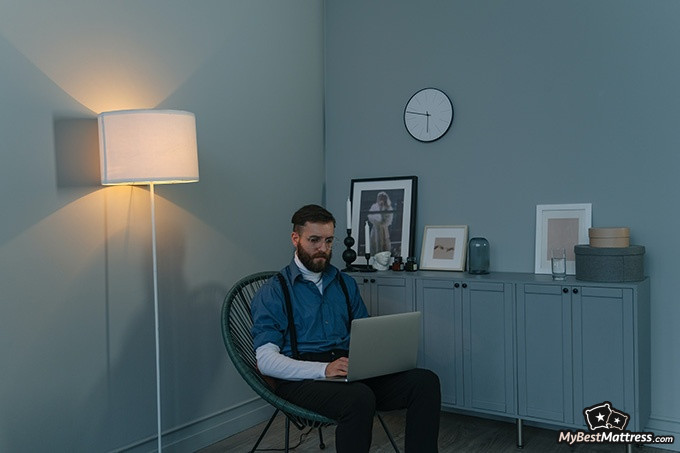
The blue light coming from your phone, tablet, computer, or TV screen reduces melatonin production and with that, you won't feel as sleepy in the evening as you should.
If an inconvenience happens and you can't skip screen time in the evening, a short session of yoga before bed may help you a lot by making you sleepier!
Yoga could even take your mind off of your smartphone and you may even forget to look at it that often.
However, remember to go to bed at a reasonable time if your work schedule is not compatible with the night owl's lifestyle.

Did you know?
Have you ever wondered which mattresses are approved as the best for sleep?
See & compare TOP mattresses side by sideAnxiety And Depression
If you are diagnosed by a professional with either of the mental disorders, you probably already know that it can cause sleeping problems. However, if you are not sure whether your racing heart, decreased appetite, and nervousness is a result of anxiety or depression, you should consider talking to a professional for your own well-being.
Moreover, if you experience some kind of symptoms like the ones mentioned, chances are, that it is for a reason. And that is nothing to be ashamed of. You are not alone.
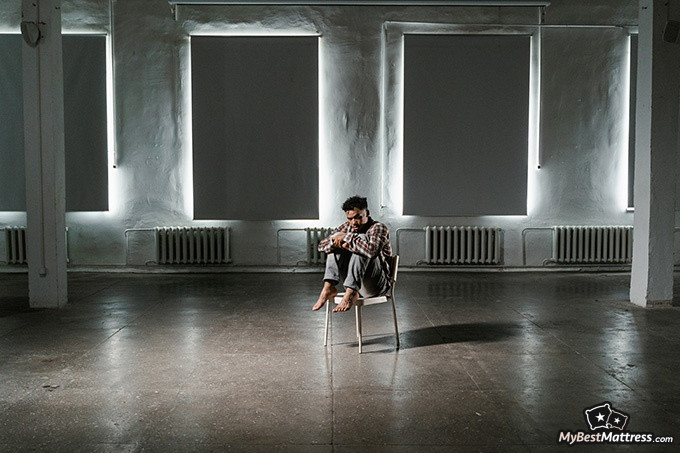
With that in mind, yoga practices can also help ease mental disorder symptoms. It's only natural that yoga for better sleep has a relaxing effect because this type of exercise is relaxing as a whole.
Take into consideration that sleeping disorders can even be core symptoms of depression[2].
Excercise
Exercise is as equally important to your body as it is to your mind. Yes, not everyone is fond of going to the gym at 7 in the morning. Because of that, yoga before bed seems like a life-saver. Have you ever experienced the joy your body feels after a good workout?
Exercise is fundamental, so do yourself a favor and find the most fun way to do it. It will get easier.
Perhaps, you will grow fond of doing yoga before bed? Let me mention that yoga may be as effective as regular exercise for improving overall health and strength, losing weight. Nonetheless, for changes to appear — you have to do it regularly.
Energy Drinks, Green Tea, and Coffee
Caffeine is addictive. Let's admit that. The magic potion of making you feel so motivated and energized at the right moment! Or maybe you consume caffeine by having a lovely ritual you created for yourself by slowly drinking coffee and watching the sunset.
But that is not good for your beauty sleep, let's put it straight. Research shows that caffeine intake 6 hours before bedtime reduced sleep time by 41 minutes[3]. It doesn't look much, but think about how it would be 2 hours prior.
Speaking of tea, we know that green tea, black tea, and other teas that are marketed as "breakfast tea" contain caffeine, so it is more suitable as a morning drink. However, there are great tea options for combining with yoga for sleep.

To put it simply — herbal teas are the best for sleep. They have naturally relaxing and soothing tendencies. For example, valerian root herbs were used to treat headaches, insomnia. It has natural sedatives: valepotriates and sesquiterpenes.
Let's add lavender to the list, which is often used in aromatherapy and has the same effect by consuming as a beverage. From my experience, the lavender scent falls into two categories — either you love it or hate it.
If you have never heard of chamomile tea, it contains apigenin[4], a mild sedative that helps to fall asleep easier. Give it a go and see if it works for you, of course, if you like the taste.
Let's not forget to mention Lemon balm and Passionflower tea. These ones are also as beneficial as the other ones by having relaxing tendencies. Lemon balm even smells excellent and also can be used in aromatherapy.
Would you agree that when you think of yoga for better sleep, you imagine it as a peaceful ritual that tea is a part of?
Combine Tea And Yoga For Better Sleep
Looks like a homemade spa? That's right. You can create a new evening routine that feels luxurious and does wonders for your health. I would believe it if you told me that this appears like some celebrities' way of winding down in the evening. But it is not. Anyone can do it. We can even call it a simple self-care routine if you prefer.
Tea and yoga could also be viewed as a natural sleep aid and a way of resetting your bio-system. Tea and yoga evenings are beneficial. But let's add a hot bath, a notebook to write your thoughts in, reading a book, meditating, and exercising as a whole are also considered natural sleep aids.
It could take more time for precise results to show than, for example, choosing a medicated treatment, but it is worth it.
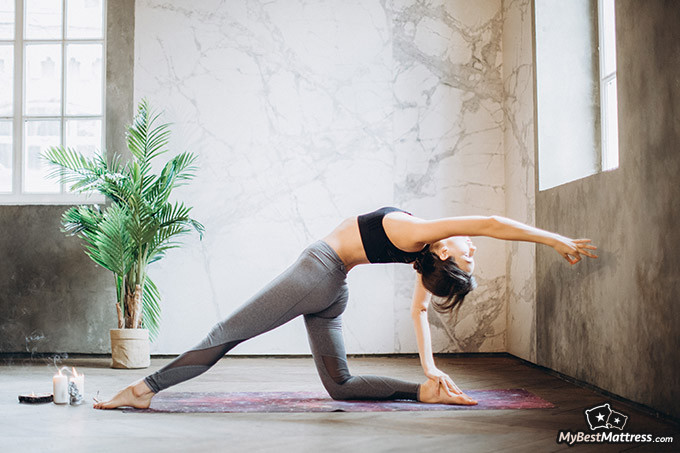
Now, if you speculated about time consumption, I can assure you that it is up to you how much space in your schedule you can dedicate to yoga before bed combined with herbal tea drinking. But you have time for that. It can be even 5 minutes a day. That's it. You definitely have 5 minutes, right?
I don't take no for an answer.
Think about it for a second. As much as it is amazing that you are always on top of your work chores and family duties it may easily fall apart. After a while, the realization could come that you don't possess the energy for any of those things anymore. That is since you ignored your own needs all this time.
Yoga is a tool that can be used to make you more mindful and acknowledge your own well-being.
Let's try to make an imaginary schedule right now:
- You come back from work
- Do your usual duties like taking a shower, having dinner
- Get ready for bed
- Make a cup of herbal tea of your choice
- Put on some relaxing music (sounds of the ocean for example)
- Start doing yoga for sleep
- Sleep on your amazingly comfortable Saatva mattress (or the one you have at the time)
The timestamps are up to you. Everything is up to you, to be honest, so no pressure. Remember to use every piece of information you find here in the most suitable way for you.
You want to make the experience enjoyable, so do not be hard on yourself. Let's imagine an amazing scenario where yoga helps you more than just by getting a better night's rest. Maybe you will be more mindful and appreciative of the things surrounding you. Perhaps you will grow fond of exercising and getting more flexible?
Think about it.
Yoga For Insomnia
Insomnia is one of the most common sleeping disorders among adults.
You can primarily identify insomnia by difficulty falling asleep or remaining asleep, feeling irritated and weak while awake. However, these symptoms can be applied to many other clinical conditions, so do not self-diagnose! If you have difficulty sleeping once a week, that doesn't mean you have insomnia. Always get diagnosed by a professional first!
Difficulty sleeping can result in:
- Anxiety
- Depression
- Decreased work performance
- Many other indicators that make your daily life way harder
Knowing that, if you experience even a tiny bit of sleeping difficulties, don't brush it off. Insomnia develops throughout time and can get worse later in life. If you have experienced early symptoms and decided to start doing yoga before bed, you are on the right track!
To add, if you are wondering about how people develop insomnia in the first place, there are many common causes such as stress, sleep habits, work, diet. These aspects regulate every bit of your life, not only sleeping.
As cheesy as it may sound — take care of your mental health as well as physical health. The majority of issues appear when you forget to look after yourself. Speaking of that, yoga for insomnia can be a two in one package for you!

Yoga can be helpful for many things. This practice is known to reduce stress[5] in general by combining physical movements, breathing, and meditation. So there is no doubt that yoga can help ease insomnia and assist in getting a better night's sleep.
For a more sufficient example, let's take a look at the medical analysis of how yoga helps women with sleeping problems and what effect it has on the quality of sleep[6]. The method of this examination was comparing two yoga groups: regular people and women with sleeping problems.
With polysomnography (a test used to diagnose sleep disorders), actigraphy (method of monitoring rest/activity cycles), they discovered significant improvements in sleep quality and positive reflections on yoga.

That does not conclude that yoga only helps women. Other research shows that elders who practice yoga regularly also have significantly better sleep quality[7]. As well as for expecting women, yoga reduces prenatal depression and anxiety[8].
However, that can be implied to all groups of people. Yoga is beneficial to almost everyone in general.
So the benefits are real, tested, and proven.
Yoga before bed could become a necessary activity to add to your nighttime routine. It is a form of self-reflection, meditation, mindfulness, improvement of physical balance, flexibility, and even strength. Considering that it relieves all the stress you collected in your body throughout the day.
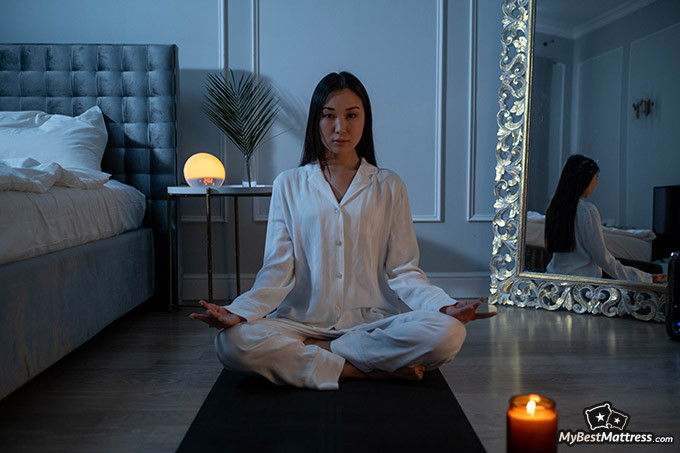
Engaging with it continually can resolve in better core strength and balance. Let's not forget your relationship with yourself and your thoughts, bearing in mind that you need to stay calm and focused throughout the process.
And let me add that the blood flows throughout the body while deep breathing and how empowering it can feel.
To specify, there are yoga poses for sleep and they can also be called yoga for insomnia and yoga before bed.
The most known yoga poses to look up:
- A wide-knee child's pose (Balasana) — for an inner sense of calmness and stability
- Standing forward bend (Uttanasana) — mostly for flexibility and relieving tension in your muscles
- Reclining bound angle (Supta Baddha Konasana) — can be performed to ease tension in your hips and groin area
- Legs up the wall pose (Viparita Karani) — for relieving feet and ankles
- Corpse pose (Savasana) — the final resting position, to let your breath return to normal
There is a wide variety of other yoga poses for sleep. I would recommend doing them right before bedtime and staying in poses for a few minutes each.
How Does Yoga Help You Sleep
Yes, there are lots of studies that prove the benefits of yoga before bed. But why is it working? How is yoga helping you sleep?
Firstly, every yogist would agree that having a good quality mattress and pillow is essential for the best sleeping experience. You can optionally even consider getting a knee pillow. After doing yoga poses, it should feel godlike to hop on Saatva or Puffy mattresses for a peaceful sleep.
Rewinding to yoga before bed, I would like to point out the most important ways yoga helps you sleep:
Exercise — as you might have guessed, it is scientifically proven that physical activity improves overall sleep quality[9]. Even if it's only 5 minutes of yoga before bed a day. Something is better than nothing! With yoga, you can get your daily stretch and muscle movement.
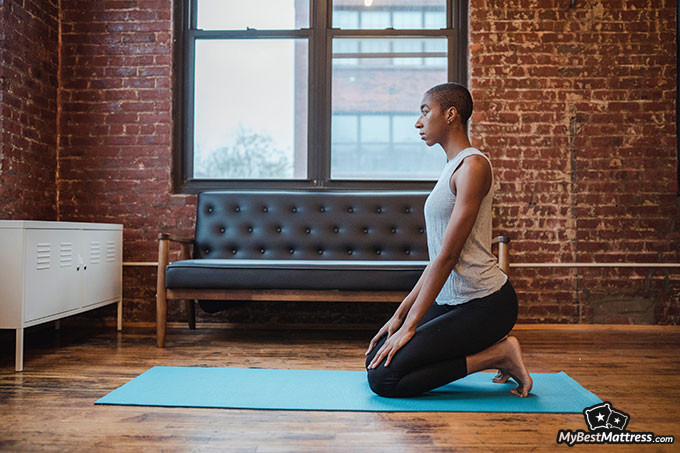
Breathing exercises — this is no shock for anyone who has ever stumbled upon yoga. Breathing can be even more important than the yoga pose itself. The most well-known example would be the "Ocean Breath."
It's done by inhaling and exhaling only from your nose and keeping the mouth closed. While exhaling and keeping your mouth closed, tighten your throat as if you are saying "Ha" and it should sound like the ocean waves.
Just remember to do it calmly and slowly for the full effect to apply. It can and will strengthen your respiratory muscles, which will improve oxygen saturation.
Being present and mindful — acknowledging your surroundings and being in the moment. Forgetting your past and future worries.
And not to forget — it promotes relaxation. This is quite self-explanatory, right?
Changing your evening routine, diet, caffeine intake, and screentime habits not only can change your sleeping quality for the better but also make you more productive during the day — for example, by researching more yoga poses for sleep.
Other Sleeping Disorders
Of course, it depends on a person, but everyone can make an effort. Where am I heading here? I am trying to say that yoga for better sleep might be beneficial for lots of different disorders. Let's make a list of a few of them:
- Restless leg syndrome — there are many symptoms like the desire to move your leg because it is twitchy, you have an urge to move in general, or it may feel like legs want to move on their own. That results in sleep disturbance.
- Sleep Apnea — revolves around breathing when asleep. There are a few types of Sleep Apnea: Obstructive Sleep Apnea (airway on the back of the throat becomes blocked), Central Sleep Apnea (there is a problem with the brain's system of controlling the muscles involved in respiration), Mixed Sleep Apnea (a combination of the two of them).
- Narcolepsy — a disorder that disrupts daytime and nighttime routines and causes excessive sleepiness during the day which can become dangerous. There are also different types of Narcolepsy.
- Excessive Sleepiness — difficulty staying awake and alert and increased desire to sleep during the day.
- Insomnia — sleeping difficulties and poor sleeping quality. Chronic insomnia is usually identified by symptoms that occur at least three times per week for a month.
And the list could go on, but let's stop here and not get ourselves too overwhelmed, okay?
To point out, by reading this list, you should be a little more conscious of a few more sleep disorders. It is beneficial for self-awareness and proficiency.
You Can Do Yoga in Bed
Yes, you read that right. Exercising without leaving your bed? On your amazing mattress? What would you think about that? Could we agree that the bed is the best place to be in your home? I would say that everyone's bedroom should be considered their safe place.
Nevertheless, if the atmosphere of your bedroom is not comforting it is time for a change. For the sake of feeling calm and cozy in your own space. My advice would be to start by adjusting the lighting — you don't want the light to be as harsh and bright as it is in your kitchen or living room for example.

Your brain creates melatonin (sleeping hormone) and reacts to the light around you. So try dimming the lights a bit and your brain will thank you.
Also, don't forget that noise interferes with a relaxing atmosphere so make sure to limit your sounds to the ones that make you feel calm.
Furthermore, do some decorating, plants, cute rugs, candles with a soothing scent. Put some books on your nightstand. Let your imagination take over and have a little fun.
After you created the space of your dreams, I assure you that you will wish to spend more time in your bed than you did previously.
For all of the people out there who do not have yoga mats or enough floor space to do yoga poses for sleep every evening this alternative is a life-saver. However, you are welcome even if you have all of the things mentioned.
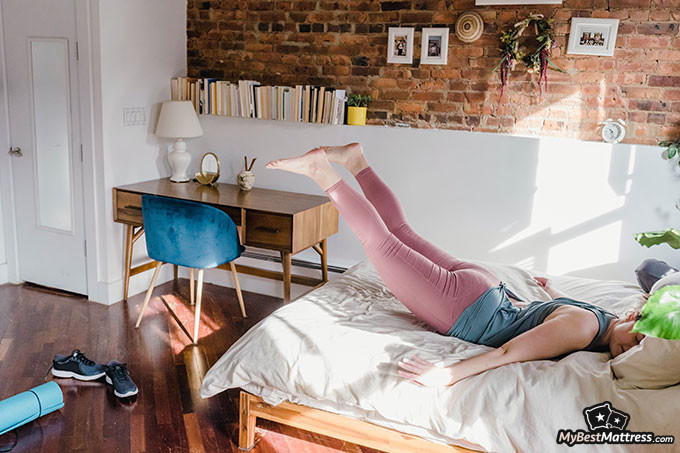
While the yoga poses for sleep I have mentioned before could work on a bed, there are lots of other ones that are more suitable.
To start off I would recommend making sure to prepare your body by gently rotating your wrists, moving your arms, legs, and ankles to warm up your joints. Also, you can comfortably lay on your back and do breathing techniques. You may already know that warm-up is important for any kind of exercise.
More examples of yoga poses for sleep you can do in your bed:
- The child's pose (Balasana) — relaxes the body, regulates breath
- The happy pose (Sukhasana) — lengthens the spine, improves posture, reduces stress, boosts digestion
- The cat pose (Marjariasana) — stretches back and neck muscles, relieves stress
- The boat pose (Naukasana) — promotes weight loss, strengthens lower muscles, boosts circulation, relieves stress
- The thunderbolt pose (Vajrasana) — strengthens and relaxes knees and joints
- The seated forward bend pose (Paschimottanasana) — reduces anxiety and stress, tones pelvic organs, increases flexibility, and stretches the spine
See a pattern here? That makes the two of us. And yes it is about stress relief.
Worth mentioning that the yoga poses for sleep listed here are not the only ones you can do. There are 84 classic asanas in total.
You can also practice these poses or any kind of yoga poses first thing in the morning after waking up if you prefer.
This way of doing yoga before bed can set you up for a sleepy mood even faster! Feeling the warm and squishy blankets underneath might remind you of a sweet dream you are about to experience.
Best Mattresses For Yoga in Bed
If this concept of doing yoga for better sleep in your bed sounds appealing, you should probably consider if you have the best kind of mattress for this experience.
As well as having a comfortable mattress for sleeping is crucial you can also accommodate it to be enjoyable for doing yoga in bed.

One of the best-rated choices of mattresses in general. To start off, temperature-wise the mattress is cool, perfect for not getting too heated, and having ventilation while doing yoga for sleep.
Another advantage is very low noise, so you could perform any kind of yoga before bed movements preferred without interrupting others or even when you feel like being in silence with your thoughts.
Lastly, great edge support, so you will not roll off and fall off the bed. Sounds funny, but it happens. Also, you can place something on the mattress more confidently — like a ball or a cube as a tool for "yoga for better sleep".
However, do not place something on the edge while moving, this mattress has rather mediocre motion isolation.
All in all this mattress can be an amazing tool to ease your sleeping problems as well as to engage in yoga before bed with enjoyment.
The price for this mattress starts from $887.

Puffy mattress is also one of the best-rated ones. In comparison to Saatva it has better motion isolation. So that could remind you of an advertisement scenario where a woman is jumping on a bed while a glass of wine is placed on the other side of it. Have you seen it? I hope you did because this is could be the kind of mattress from that advertisement.
Not surprisingly, this mattress is also known for its noise reduction. This is a great quality for doing yoga in bed. However, it does have weak edge support, so be cautious about laying on the side of it. You may fall off as the majority of us did in our childhood.
Worth pointing out that it is not as good at temperature control as Saatva mattress so it can get a bit warmer while doing yoga before bed.
The price for this mattress starts from $1,499.
Conclusions
By choosing to attempt yoga for sleep, I believe you are quite open-minded and ready for a new challenge. Thinking of today's world still going through a global pandemic, it may be normal to experience difficulties regarding mental health and sleeping. You are certainly not alone.
Also, remember about the concept of doing yoga in bed and if you decide to try it, make the experience unbeatable. Brew yourself some hot cup of valerian root herbal tea and jump on the most comfortable Saatva, Puffy, or any other mattresses of your choice. The bed is not only for sleeping, we all know that, right?
Thanks for sticking with me till the end, and I can't wait to see you in my next article!
Scientific References
1. Marie-Pierre St-Onge,*Anja Mikic, Cara E Pietrolungo 'Effects of Diet on Sleep Quality'
2. David Nutt, DM, FRCP, et al. 'Sleep disorders as core symptoms of depression'
3. Christopher Drake, Ph.D., F.A.A.S.M., et al. 'Caffeine Effects on Sleep Taken 0, 3, or 6 Hours before Going to Bed'
4. Bahare Salehi, Alessandro Venditti, Mehdi Sharifi-Rad, et al. 'The Therapeutic Potential of Apigenin'
5. Alisha L Francis, Rhonda Cross Beemer 'How does yoga reduce stress? Embodied cognition and emotion highlight the influence of the musculoskeletal system'
6. Wei-Li Wang , Kuang-Huei Chen, Ying-Chieh Pan, et al. 'The effect of yoga on sleep quality and insomnia in women with sleep problems: a systematic review and meta-analysis'
7. V. R. Hariprasad, P. T. Sivakumar, V. Koparde, et al. 'Effects of yoga intervention on sleep and quality-of-life in elderly: A randomized controlled trial'
8. Tiffany Field, Miguel Diego, Jeannette Delgado, et al. 'Tai chi/yoga reduces prenatal depression, anxiety and sleep disturbances'
9. Iuliana Hartescu, Kevin Morgan, Clare D Stevinson 'Increased physical activity improves sleep and mood outcomes in inactive people with insomnia: a randomized controlled trial'
Leave your honest feedback
Leave your genuine opinion & help thousands of people to choose the best mattress. All feedback, either positive or negative, are accepted as long as they’re honest. We do not publish biased feedback or spam. So if you want to share your experience, opinion or give advice - the scene is yours!



